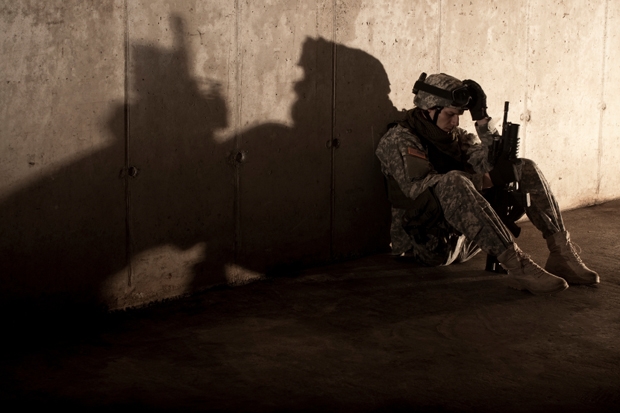‘Of all civilisation’s occupational categories, that of soldier may be the most conducive to regular drug use.’
The problem with this statement — the first words of this book — is the problem with the book as a whole: it may be correct, and there again it may not be. Even the captionless cover photograph is ambiguous: of an American soldier, in Vietnam perhaps, with a corncob pipe which may or may not contain a banned substance, though we are obviously meant to infer that it does.
Then there is the inconclusiveness: ‘One may say that to a lesser or greater degree drugs shaped warfare.’ Yes, one may; but to a lesser or greater degree one may say that about almost everything.
Historians have dedicated little or no attention to the use of psychoactive substances by combatants, armies, and states, since not only was the topic rather inconvenient but it was also rather taboo.
Again, why the hedging? Is it ‘little’ or is it ‘no’? The book’s extensive bibliography suggests it isn’t ‘no’, but if drugs shaped warfare only to a lesser degree, might historians have been justified in dedicating little attention to it?
And so much of Lukasz Kamienski’s history is speculative, vague and inconsistent. Of the first world war, for example, this professor from Jagiellonian University, Krakow, writes:
The rate of cocaine use by soldiers remains unknown, and there is no way to estimate the figures. What is certain, however, is that never before and never after did the military consume such large amounts of this drug as it did in 1914–1918, not only for medical purposes but also for the enhancement of performance.
Some assertions are wholly unsupported, such as that at Gallipoli, before attacks, ‘Australian soldiers were administered significant amounts of the drug.’ And what exactly is meant by the following?
The command of the British Army decided to try it [a mixture of cocaine and cola nut extract in tablet form] on the soldiers of the expeditionary force in Europe.
Kamienski cites no evidence other than Conny Braam, a Dutch author of fiction, who, ‘based on research in numerous British archives and libraries’, concluded that British soldiers ‘got a cup of rum before they went over the top, and the cocaine might have been in the rum, because with alcohol it works doubly well.’ (Presumably this was after the legendary issue of tea mixed with bromide to quell sexual arousal.) In Braam’s 2011 novel The Cocaine Salesman a British officer, Robin Ryder, tells
how they’d coerced him into taking cocaine in the trenches to help overcome his mortal fear. How objecting almost landed him in front of the firing squad for insubordination and cowardice,
and how thereby he became addicted. Kamienski writes: ‘This is, of course, a literary account, but a very plausible one.’ Who knows? But it’s hardly the epitome of scholarship in a book that purports to be ‘the definitive history of intoxication in warfare’.
‘Girls often brought to the train station a cocaine kit as an ideal gift for their loved ones leaving for war,’ we are told. Apparently you could get it at Harrods, though in May 1916 the Army prohibited all psychoactive substances except by prescription, and the ban was extended to civilian suppliers under the Defence of the Realm Act. Was this evidence of a ‘cocaine panic’? With two million men under arms, nothing would be surprising, except perhaps that things weren’t demonstrably worse.
But that said, elsewhere Kamienski can be methodical and give detailed figures. Much of his narrative is fascinating, plenty of it is new, and he advances some serious arguments, not least in connection with the child soldiers, ‘pumped up with drugs’, that present such problems to peacekeepers. He cites the intervention in Sri Lanka in 1987–90 when, faced with Tamil Tiger child soldiers, Indian troops refused to fight. A few years later, the Tigers’ Leopard Brigade, mainly comprising child orphans, surrounded and killed hundreds of Sri Lankan regulars who had been too scrupulous for their own good.
He is not entirely correct, however, in equating this with the capture in August 2000, by a gang called the ‘West Side Boys’, of a British Army patrol in Sierra Leone — the latter’s ‘humanitarianism, empathy and traditional western concepts of childhood’ staying their trigger fingers. The West Side Boys were hardly children, though they were, for whatever reason, seriously hyped. The subsequent rescue operation by the SAS and Parachute Regiment was very bloody indeed. Kamienski nevertheless makes the valid point that
the western military must be carefully trained and psychologically prepared for a confrontation with children in arms. Fighting juvenile soldiers high on drugs may indeed be frustrating and culturally confusing.
This is a wide-ranging and at times scholarly book. But significant bits of it need to be taken with a pinch of something — preferably salt.






Comments